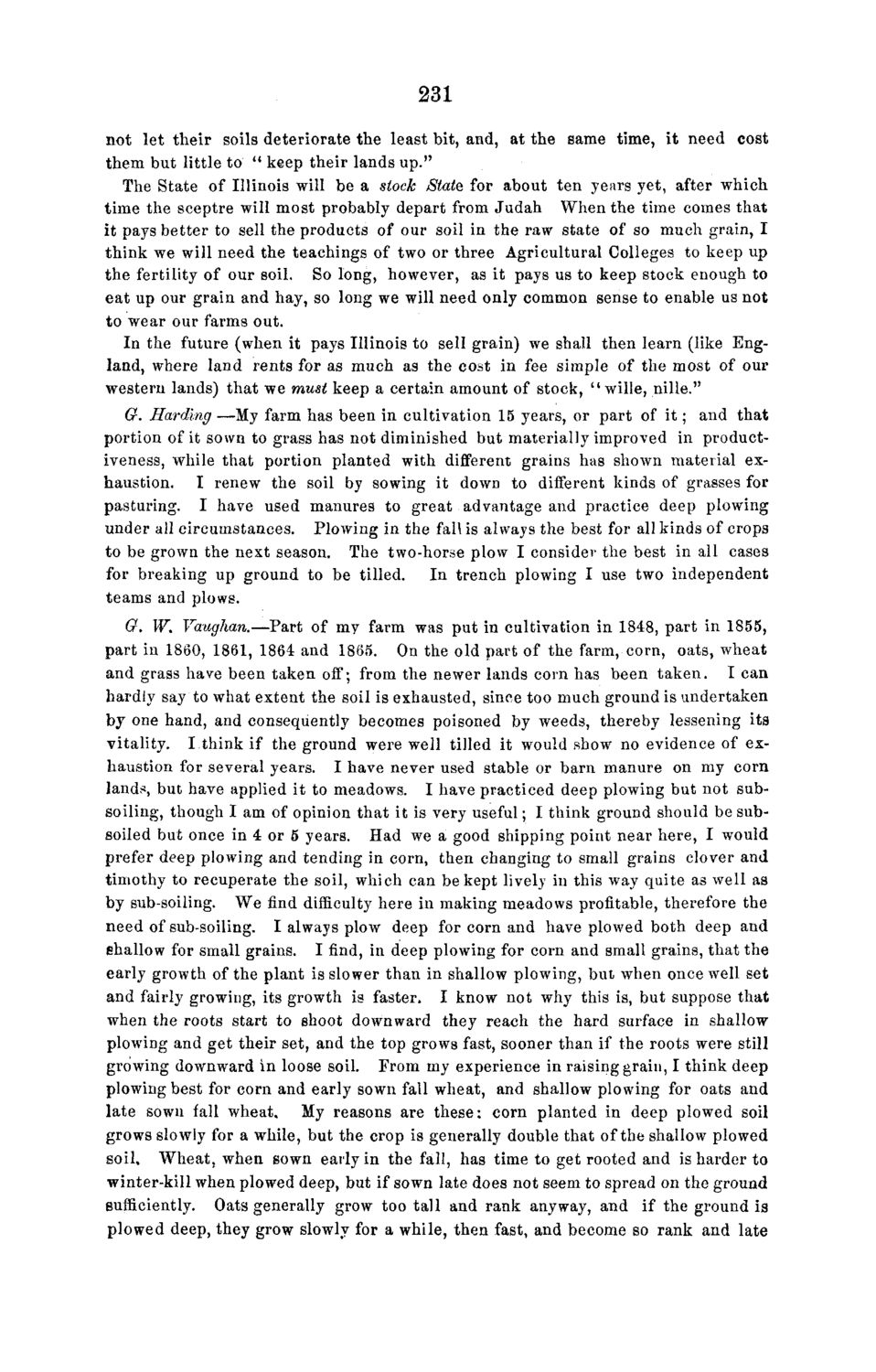| |
| |
Caption: Board of Trustees Minutes - 1868
This is a reduced-resolution page image for fast online browsing.

EXTRACTED TEXT FROM PAGE:
231 not let their soils deteriorate the least bit, and, at the same time, it need cost them but little to " keep their lands up." The State of Illinois will be a stock State for about ten years yet, after which time the sceptre will most probably depart from Judah When the time comes that it pays better to sell the products of our soil in the raw state of so much grain, I think we will need the teachings of two or three Agricultural Colleges to keep up the fertility of our soil. So long, however, as it pays us to keep stock enough to eat up our grain and hay, so long we will need only common sense to enable us not to wear our farms out. In the future (when it pays Illinois to sell grain) we shall then learn (like England, where land rents for as much as the cost in fee simple of the most of our western lands) that we must keep a certain amount of stock, u wille, nille." G. Harding —My farm has been in cultivation 15 years, or part of i t ; and that portion of it sown to grass has not diminished but materially improved in productiveness, while that portion planted with different grains has shown material exhaustion. I renew the soil by sowing it down to different kinds of grasses for pasturing. I have used manures to great advantage and practice deep plowing under all circumstances. Plowing in the fall is always the best for all kinds of crops to be grown the next season. The two-horse plow I consider the best in all cases for breaking up ground to be tilled. In trench plowing I use two independent teams and plows. O. W% Vaughan.—Part of my farm was put in cultivation in 1848, part in 1855, part in 1860, 1861, 1864 and 1865. On the old part of the farm, corn, oats, wheat and grass have been taken off; from the newer lands corn has been taken. I can hardly say to what extent the soil is exhausted, since too much ground is undertaken by one hand, and consequently becomes poisoned by weeds, thereby lessening its vitality. I think if the ground were well tilled it would show no evidence of exhaustion for several years. I have never used stable or barn manure on my corn lands, but have applied it to meadows. I have practiced deep plowing but not subsoiling, though I am of opinion that it is very useful; I think ground should be subsoiled but once in 4 or 5 years. Had we a good shipping point near here, I would prefer deep plowing and tending in corn, then changing to small grains clover and timothy to recuperate the soil, which can be kept lively in this way quite as well as by sub-soiling. We find difficulty here in making meadows profitable, therefore the need of sub-soiling. I always plow deep for corn and have plowed both deep and shallow for small grains. I find, in deep plowing for corn and small grains, that the early growth of the plant is slower than in shallow plowing, but when once well set and fairly growing, its growth is faster. I know not why this is, but suppose that when the roots start to shoot downward they reach the hard surface in shallow plowing and get their set, and the top grows fast, sooner than if the roots were still growing downward in loose soil. From my experience in raising grain, I think deep plowing best for corn and early sown fall wheat, and shallow plowing for oats and late sown fall wheat. My reasons are these: corn planted in deep plowed soil grows slowly for a while, but the crop is generally double that of the shallow plowed soil. Wheat, when sown early in the fall, has time to get rooted and is harder to winter-kill when plowed deep, but if sown late does not seem to spread on the ground sufficiently. Oats generally grow too tall and rank anyway, and if the ground is plowed deep, they grow slowly for a while, then fast, and become so rank and late
| |